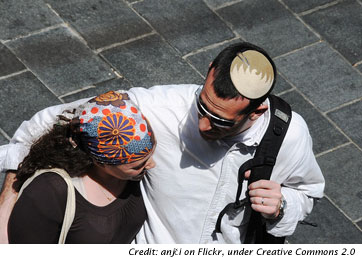
 JERUSALEM (WOMENSENEWS)–An Israeli women’s rights organization is deciding whether to ask the High Court here to reconsider its ruling on a divorce practice it says allows men to blackmail estranged wives seeking to remarry.
JERUSALEM (WOMENSENEWS)–An Israeli women’s rights organization is deciding whether to ask the High Court here to reconsider its ruling on a divorce practice it says allows men to blackmail estranged wives seeking to remarry.
"The court did not completely ban the practice of paying off recalcitrant husbands," said
Susan Weiss, director of the Jerusalem-based Center for Women’s Justice.
Weiss said her organization, which won the first ruling, is considering asking for a rehearing of the case before an expanded court with additional judges.
In September the group gained a concession when Dorit Beinisch, the High Court’s female president, ruled that women seeking to remarry need not pay their husbands more than $2,500 in a divorce "incentive" and that a rabbinical committee must agree to the payment.
Weiss added that the court also accepted a demand that a woman must be on the committee that decides when to make those payments.
Rabbinical courts have paid recalcitrant husbands from $2000 to $16,500 to grant their estranged wives freedom in the past. The funds come from "an anonymous private donor" who has not been identified, according to the Israeli daily newspaper Ha’aretz.
But Beinisch fell far short of banning the payment practice, saying that paying husbands to provide a religious writ of divorce–or "get"–was better than leaving such women– known as agunot–chained to an unwanted marriage. Husbands are not required to receive a get from their wives.
Thousands of Jewish men both in Israel and abroad deny their wives a get. Many try to extort money and property and threaten to fight for full custody of their children before agreeing to a divorce, Jewish women’s advocates say.
Receiving a Get Necessary
For women, receiving a get is imperative since there is no civil divorce in Israel and children born to a married woman and her lover are highly stigmatized under Jewish law. The offspring of a married man with a woman not his wife are not similarly labeled.
In her ruling, Beinisch described the status of agunot as "one of the most difficult and complex social-legal problems in Israel today."
Beinisch said the rabbinical courts’ practice of compensating some recalcitrant husbands is a sincere attempt "to provide concrete solutions in order to resolve certain cases."
Elana Maryles Sztokman, a writer, educator, researcher and activist, disagreed.
"This ‘resolution’ puts the courts, and religious law, to shame," Sztokman wrote in the Sisterhood blog of the Forward, a Jewish newspaper in New York.
Frances Raday, a professor of international law at the College of Management Academic Studies in the city of Rishon Lezion, likened the court decision to a Band-Aid on a cancerous sore.
"The idea of paying men to give a divorce is a sign of the inadequacy of the male-dominated rabbinical courts to find solutions to this problem," she said.
While Jewish law requires a husband must give a get of his own free will, Raday said, the vast majority of rabbis do not use the legal means at their disposal–which include taking a man’s passport and ordering imprisonment–to procure a woman’s freedom.
The rabbinical courts are "giving recalcitrant husbands a prize rather than a punishment," Raday said.
Would you like to Comment but not sure how? Visit our help page at https://womensenews.org/help-making-comments-womens-enews-stories.
Would you like to Send Along a Link of This Story?
Michele Chabin, an award-winning journalist, has been reporting from Israel for more than two decades.
 JERUSALEM (WOMENSENEWS)–An Israeli women’s rights organization is deciding whether to ask the High Court here to reconsider its ruling on a divorce practice it says allows men to blackmail estranged wives seeking to remarry.
JERUSALEM (WOMENSENEWS)–An Israeli women’s rights organization is deciding whether to ask the High Court here to reconsider its ruling on a divorce practice it says allows men to blackmail estranged wives seeking to remarry.

